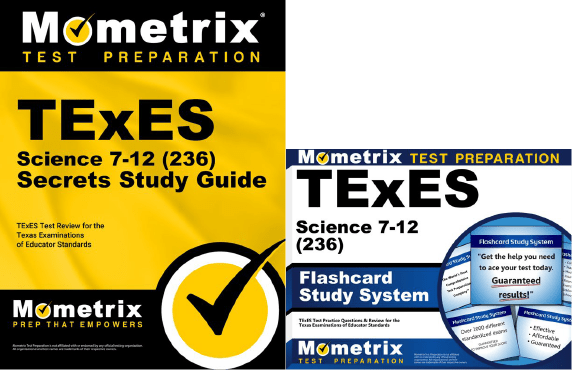If you need help studying for the TExES Science 7-12 exam or just want some more information about what the exam is like, you’ve come to the right place.
Click below to take a free TExES Science 7-12 practice test!
What’s on the Exam?
There are 140 multiple-choice questions on the exam, and the time limit is 4 hours and 45 minutes. There aren’t any scheduled breaks, but you’re free to take restroom breaks as needed.
Let’s take a closer look at the different sections of the exam.
1. Scientific Inquiry and Processes
10% of the exam
- Selecting and managing learning activities to ensure student safety
- The nature of science
- The process of scientific inquiry
- The history of science
- The impact of science on the daily lives of students
2. Physics
20% of the exam
- The description of motion in one and two dimensions
- The laws of motion
- The concepts of gravitational and electromagnetic forces in nature
- Electricity and magnetism
- The conservation of energy and momentum
- The laws of thermodynamics
- The behavior of waves
- Fundamental quantum physics concepts
3. Chemistry
20% of the exam
- Characteristics of matter and atomic structure
- The properties of gas
- Characteristics of ionic and covalent bonds
- Chemical equations and reactions
- Properties of solutions
- Energy transformations that occur in physical and chemical processes
- Nuclear fission and nuclear fusion
- Oxidation and reduction reactions
- Acids and bases
4. Cell Structure and Processes
8% of the exam
- The structure and function of biomolecules
- Specialized parts of cells that form specific functions
- How cells carry out life processes
- The growth and development of specialized cells, tissues, organs, and organisms
5. Heredity and Evolution of Life
8% of the exam
- The structures and functions of nucleic acids in the mechanisms of genetics
- The continuity and variations of traits from generation to generation
- The theory of biological evolution
- Evidence for evolutionary change during Earth’s history
6. Diversity of Life
8% of the exam
- Similarities and differences between living organisms
- The processes by which organisms maintain homeostasis
- The relationship between biology and behavior
7. Interdependence of Life and Environmental Systems
6% of the exam
- The relationships between abiotic and biotic factors of terrestrial and aquatic ecosystems, habitats, and biomes
- The interdependence and interactions of living things
- The relationship between carrying capacity and population changes in ecosystems
8. Earth’s History and the Structure and Function of Earth Systems
9% of the exam
- The structure and function of the geosphere
- Processes of plate tectonics, weathering, erosion, and deposition that change Earth’s surface
- The formation and history of Earth
- The structure and function of the hydrosphere
- The structure and function of the atmosphere
- The effects of natural events and human activity on Earth systems
9. Components and Properties of the Solar System and the Universe
6% of the exam
- The implications of Earth’s placement and orientation in the solar system
- The role of the Sun in the solar system
- Composition, properties, and history of the universe
- The history and methods of astronomy
10. Science Learning, Instruction and Assessment
5% of the exam
- Research-based theoretical and practical knowledge about teaching science
- The role of scientific inquiry in science instruction
- How students learn science
- Monitoring and accessing learning in lab, field, and classroom settings
Computer-Adaptive Testing (CAT)
The TExES Science 7-12 exam is a computer-adaptive test. Basically, this means that the questions will become harder or easier as you go through the exam, based on how well you’re answering the questions.
For example, say you answered the first question correctly. The first question is of medium difficulty, so the next question will be slightly harder. Then, let’s say you answered the second question incorrectly. The next question would then be a medium question.
How to Register
To get started with your registration, you’ll need to create an account on the NES website. You can then register for the exam and schedule a test date through your account.
Exam Scores
The test is scored using a scaled scoring method. Here’s how it works:
For every question you answer correctly, you get one point added to your raw score. At the end of the test, your final raw score will be converted to a scaled score. This scaled score will range somewhere between 100 and 300.
The reason your raw score is converted to a scaled score is because everyone who takes the test is given a slightly different set of questions. Since everyone has a different arrangement of questions, and because some questions are harder than others, converting your raw score to a scaled score ensures a more even playing field.
FAQs
How many questions are on the TExES Science 7-12 exam?
The exam contains 140 questions.
What is the time limit for the TExES Science 7-12 exam?
The exam is timed at 4 hours and 45 minutes.
What is the passing score for the TExES Science 7-12 exam?
You’ll need to get a final scaled score of at least 240 to pass.
How much does the TExES Science 7-12 exam cost?
The testing fee is $116.
Mometrix Test Preparation is not affiliated with or endorsed by any official testing organization. All organizational and test names are trademarks of their respective owners.



 TExES Study Guide
TExES Study Guide TExES Flashcards
TExES Flashcards
